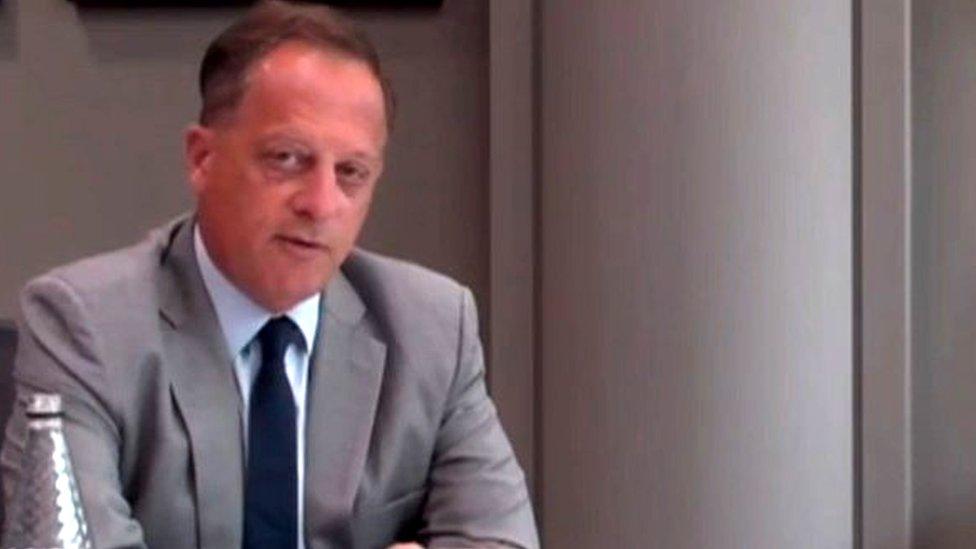Richard Sharp: BBC chairman says he will not quit over Boris Johnson loan row
- Published
Watch: Richard Sharp says he is "confident" appointment was on merit
The chairman of the BBC says he won't quit over the Boris Johnson loan row.
Richard Sharp is accused of helping facilitate a loan to the then prime minister, when Mr Sharp was applying to be BBC chairman.
His appointment is now under review by the Commissioner of Public Appointments.
Mr Sharp denies being involved in any loan and told the BBC he believes he will be exonerated because he "was appointed on merit".
He has been called to give evidence to MPs on the Digital, Culture, Media and Sport Select Committee on 7 February to cover issues raised at a previous hearing and "developments since then".
Richard Sharp sat down with me ahead of a senior BBC management conference in London.
He doesn't appear to be a man who thinks he has done anything wrong.
He repeated several times he was confident that the process to appoint him was "rigorous" and is confident that the commissioner, William Shawcross, will find in his favour.
After a weekend of reports suggesting cronyism, on Monday, he emailed BBC staff denying he had been involved in making a loan or arranging a guarantee or any financing.
On Tuesday he gave some more information about what happened, welcomed the scrutiny and maintained he had taken steps to ensure "due process was followed by the book".
He detailed how he contacted Cabinet Secretary Simon Case to discuss an offer of financial assistance being made for the then PM.
That came from Sam Blyth, a multimillionaire who Mr Sharp described as an "old friend" and who is also a distant cousin of Mr Johnson.
Mr Blyth had offered to be the guarantor on a loan for Mr Johnson after reading press reports that he was under financial pressure.
Mr Sharp was involved in discussions in December 2020, a few weeks before being announced as the government's choice for the senior BBC role.
I suggested to Mr Sharp that his decision to introduce Sam Blyth to the cabinet secretary when he was applying to be BBC chairman in fact looked like an error of judgment.
He said: "With all this fuss, with the benefit of hindsight, particularly at that time I might have said 'Do it yourself', but I was working in Downing Street at the time as the economic advisor to support industries".
He insisted Mr Johnson's personal finances were not discussed when they dined with Mr Blyth in May 2021, three months after beginning his BBC role.
They dined together outside at Chequers, the PM's grace and favour home, an occasion described as a "social meeting" by Mr Sharp.
Describing the meeting, he said: "Sam came to me and said, 'Do you want to come to Chequers? I'm going down to have dinner with Al' [an abbreviation of Mr Johnson's first name Alexander].
"I said, 'yeah, great' - I'd never been to Chequers and Sam drove me down and we had dinner and I took advantage of that opportunity to bat for the BBC."
He said the loan arrangement did not come up and insisted that he doesn't "know anything" about Mr Johnson's personal finances.
Mr Sharp said he made the cabinet secretary aware of his application to be chairman when he told him about Mr Blyth's financial offer in late 2020.
I asked him why he didn't raise this meeting during his application process to be BBC chairman. I suggested even if he didn't think he had done anything wrong, he should have "over declared" to ensure full transparency
Mr Sharp said: "I don't think having a meeting with the most senior civil servant to discuss avoiding a conflict is a notifiable conflict in itself."
He notified Mr Johnson of the meeting "as a courtesy and explained why" it was taking place. The then PM "acquiesced".
Mr Sharp said his involvement ended when the cabinet secretary advised it could be perceived as a conflict of interest. Similar advice was given to Mr Johnson.
Candidates for public roles are asked a series of questions around conflicts of interest. That includes whether there is anything that, if it came to light, could embarrass either the government or the organisation.
I put it to Mr Sharp that the furore over his involvement in this story has done exactly that.
Yet again, he repeated that his meeting with the cabinet secretary justified his actions.
The BBC is making huge efforts to ensure impartiality and transparency are at the heart of what it does. I asked Mr Sharp how he can continue to be the public face of the corporation on these issues, when his actions are being called into question.
Mr Sharp asked viewers to "judge us by our output" which he said was "world class".
He added: "We define ourselves increasingly by being impartial in the way we both represent news and the breadth of our content."
There have been criticisms that Mr Sharp overstepped his functions by sitting on an interview panel for the new director of news role, given to Deborah Turness.
He confirmed he was on the panel and said "there was nothing untoward in that".
He says the director of news is also a member of the board, so "it was also a board position. There were also members of the board on that panel".
Mr Sharp denied meddling in editorial issues, saying he would only become involved if there had been a complaint.
He will hope this interview will draw a line under the story. That looks unlikely for now.
Whatever he's said, until the government watchdog completes its review, criticisms and questions will remain.
No timescale has been given for when that will happen.
Additional reporting by Sean Seddon
- Published23 January 2023
